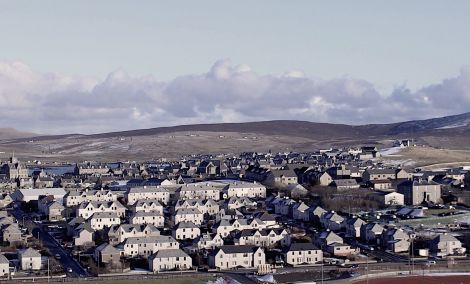News / Calls for more action on resettling refugees
A NEW group has been formed by likeminded locals who feel more can be done to resettle Syrian refugees in Shetland.
Gulberwick-based businessman Dennis Leask said the informal group, which has a handful of people on board, has come together to encourage the council to “take some action” on bringing in refugees from the war-torn country.
Shetland Islands Council infrastructure director Maggie Sandison said a number of factors, including housing and the lack of specialist help, has delayed any families moving to the isles after the council agreed in 2015 to play its part in a UK-wide resettlement scheme.
Northern Isles MP Alistair Carmichael said while it is “clear that more action is needed” from the UK government on the matter, in his view the SIC “could take a more active role”, particularly in coordinating housing.
Last month two families from war-torn Syria moved to Orkney, while hundreds have already been settled elsewhere in Scotland.
Sandison confirmed Shetland was asked to be part of March’s resettlement, but there was not any suitable accommodation available.
Leask said he understands some of the reasons why no families have been resettled in Shetland, but he thinks more can be done.
The group includes former judge and refugee law expert Geoffrey Care, while retiring Lerwick South councillor Jonathan Wills has also been involved in discussions.
The group emanated from a meeting last year with interested parties including Carmichael, Shetland MSP Tavish Scott and SIC convener Malcolm Bell.
But Leask and Care said they both felt “rather disappointed” with the outcome of the meeting and sought to explore the reasons why the council was not “adopting a more proactive approach”.
“I’m not saying the council isn’t sympathetic to it,” Leask said. “I just feel they’ve not really thought through to actioning the thing properly.
Become a member of Shetland News
“I sense there’s a huge goodwill towards these groups of people, but there’s just no vehicle to deliver that goodwill just now.”
One proposal suggested by Leask to overcome the lack of accommodation is a scheme, potentially administered by community councils, where local people could donate money towards privately renting properties for refugee families.
It could amount £1 or less a week per household, he said, and could see refugees integrated across the isles.
“All the other issues pale into insignificance – accommodation is the big one,” Leask added.
“The rest will automatically fall into place once they’re here and they get appropriate accommodation.”
Sandison said the council has been looking into rehoming at least two families in Shetland, with Lerwick regarded as the most suitable location due to its proximity to vital services, such as medical treatment.
She said the council is keen to see the resettlement prove a success and give families – who would likely speak no English on arrival – as much help as possible, and added that it is thought that relocating refugees to outlying areas may limit access to services.
“Our engagement with the Home Office has been largely silent,” Sandison added.
“If it wasn’t for the Scottish Government’s pro-activeness, we’d probably never hear anything. They’re certainly not approaching us about anything.”
Other issues which have prevented the SIC from moving quicker include the lack of Arabic interpreters and the scheme’s initial problems with securing passports and national insurance numbers for refugees arriving in Scotland.
Carmichael said he has been working with people in Shetland who have been calling for more action on resettling refuges for “some months”.
“Local authorities need support to ensure accommodation, language lessons, and training is available so that these refugees can begin to rebuild their lives, and contribute to our communities,” he said.
“I do believe that the council could take a more active role to play here. We know that there is pressure on public housing stock but other housing could be found. The council is the obvious body to coordinate these efforts.”
He also criticised the UK government for not taking in more lone children from Syria after closing its ‘Dubs’ scheme, which was set up to relocate children who had reached Europe unaccompanied.
In 2015, the SIC voted in favour of playing its part, if required, in housing refugees as part of the UK government’s vulnerable persons relocation scheme.
It followed a government commitment to resettle 20,000 Syrian refugees from camps by 2020.
Local authorities can receive financial assistance to resettle refugees, but Sandison said she hoped officials would take into consideration the higher cost of living in the isles.
“[We’ve] spoken to the Scottish Government and the Home Office and social security ministers about the fact that we feel our refugees, when they get settled in Shetland, there should be a recognition that the cost of living in Shetland is so much higher,” she said.
“We clearly want this to be a successful resettlement.”
There has already been grassroots support locally for the wider issue, with the Shetland Solidarity with Refugees group collecting donations to ship much-needed supplies to camps since 2015.
Another group, Shetland Supports Refugees, was set up with the aim of creating a network to help any refugees hoping to integrate into the local community.
Become a member of Shetland News
Shetland News is asking its many readers to consider paying for membership to get additional features and services: -
- Remove non-local ads;
- Bookmark posts to read later;
- Exclusive curated weekly newsletter;
- Hide membership messages;
- Comments open for discussion.
If you appreciate what we do and feel strongly about impartial local journalism, then please become a member of Shetland News by either making a single payment, or setting up a monthly, quarterly or yearly subscription.






























































